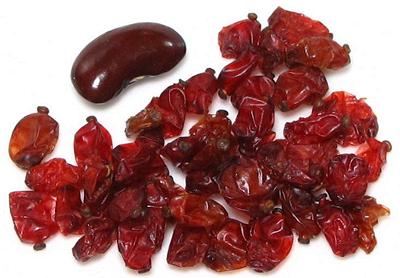 [Common Barberry, European Barberry; Zereshk (Persian for dried);
Kotsakburi (Georgian); Berberis (Arabic); Agracejo (Spanish);
Berberis vulgaris | Bidaneh (Persian);
Berberis integerrima (seedless variety)]
[Common Barberry, European Barberry; Zereshk (Persian for dried);
Kotsakburi (Georgian); Berberis (Arabic); Agracejo (Spanish);
Berberis vulgaris | Bidaneh (Persian);
Berberis integerrima (seedless variety)]
The fruit of this shrub is rather tart from being high in vitamin C. It was once widely used in Europe as a souring agent, but has been replaced by citrus fruits due to difficulty harvesting - lots of very sharp spines on the branches. The berries are still made into jams to some extent. Today, this fruit is most popular in Iran.
Barberry was once very common in North America and used for jam and wine, but it is an alternate host for a very serious wheat stem rust, so has been eradicated from large regions and is illegal in Canada. There are varieties of barberry immune to the rust, and these are allowed in quarantine regions in the United States.
More on Buttercups.
In Iran and Afghanistan, these berries are sprinkled on top of rice pilafs, and also used in chicken and meat dishes. In Georgia they are ground and used to add a fruity flavor to meat and meat dumplings, and are similarly used in Armenia. In Georgia, they are also made into a very sour syrup. In northwest India, they are pickled and used with curries.
Substitute: Ground Sumac, easily available from markets serving an eastern Mediterranean community, is a suitable substitute.
bc_barbz 150803 - www.clovegarden.com